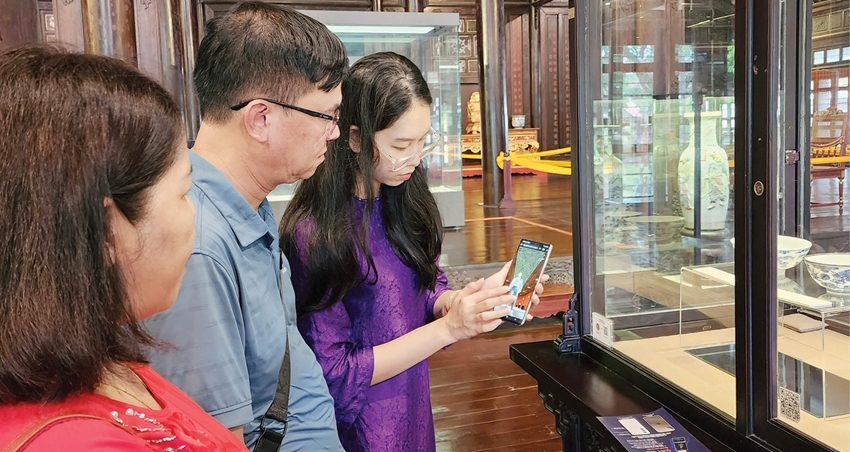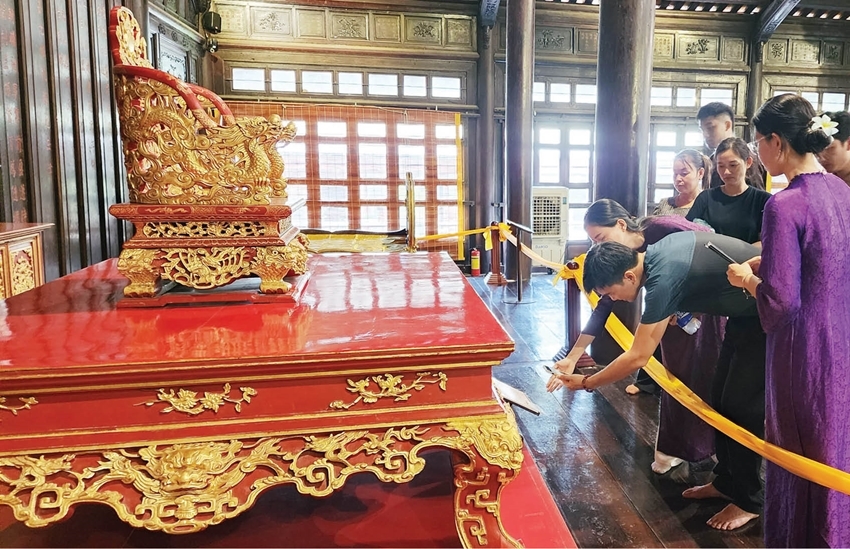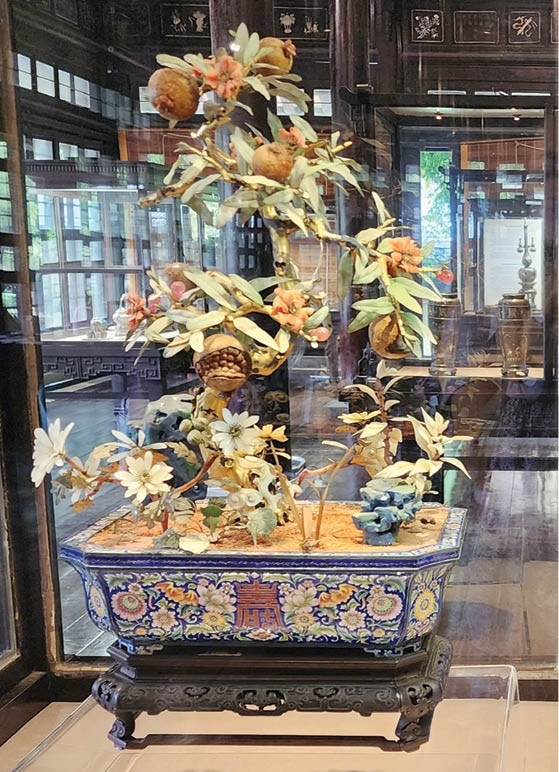 |
| Visitors are guided to experience the digital application while visiting artifacts |
Applying technology for artifact identification
The Hue Monuments Conservation Center (HMCC) has announced its collaboration with the Provincial Information Technology Center and Phygital Labs in utilizing digital identification technology for 10 artifacts of the Nguyen Dynasty at Hue Museum of Royal Antiquities. Simultaneously, they are launching the first metaverse cultural exhibition space integrated with the Apple Vision Pro.
The artifacts are equipped with NFC chips and identified using Nomion technology - a digital identification of everything, ensuring transparency and uniqueness of the product both in physical and digital spaces by Phygital Labs. Ten selected artifacts are chosen for trial identification, representing characteristic aspects of the Nguyen dynasty rulers' material life, ceremonies, politics, and ideology.
Director of the HMCC, Mr. Hoang Viet Trung, shared: "Phygital Labs' technology serves as a bridge to bring preserved and exhibited artifacts into the digital world, supporting efforts of digitization, preservation, and promotion of the values of the artifacts in particular, and those of the Nguyen Dynasty and Hue’s culture in general."
 |
| Visitors use smartphones to interact with NFC chips to access information about the artifacts. |
Accordingly, the artifacts that have been digitally identified will also be displayed in the digital space so that users worldwide can fully explore and admire the sharp 360-degree details of the items, experiencing fascinating historical stories in an authentic cultural-historical space. To visit this valuable series of artifacts in the digital space, all people need to do is access the website at https://museehue.vn.
Deputy Director of Hue Museum of Royal Antiquities, Mr. Truong Quy Man, stated: "All QR codes and Nomion NFC chips are placed in front of each artifact. Visitors can interact with NFC chips using their smartphones to access specific content without downloading any app or entering any additional information, opening up a multidimensional interaction with the entire historical information, origins, cultural significance, 3D images... of the artifacts. With both of these features, tourists can easily and vividly experience the artifacts in the digital space and the virtual museum."
Notably, this digital space has integrated Apple Vision Pro, leading the way in Extended Reality (XR) technology pioneered by Apple and Meta.
Bringing heritage into the digital economy
To promote Vietnamese culture globally and harness the digital economic potential of heritage, the vision of the HMCC and Phygital Labs will focus on providing Metaverse museum tour services to promote Hue and Vietnam through heritage to global visitors, especially the over 20 million individuals worldwide owning devices like Apple Vision Pro and Meta Quest.
 |
| One of the artifacts identified at Hue Museum of Royal Antiquities |
Nam Do, Chief Technology Officer of Phygital Labs, believed that digital physics is still a novel concept in Vietnam. However, if applied correctly, digital physics can enhance the value of items in both the digital and physical worlds, automate processes and user experiences, reduce effort and storage costs, and increase user trust due to its transparency and high authenticity. Beyond the digital economy, solutions for the identification of everything also help preserve, conserve, and spread the nation's cultural values to internet users worldwide in a simple, cost-effective, and efficient manner.
"From the immersive experience of digital exhibitions, we have an additional opportunity to sell tickets, increasing revenue from a digital customer segment that currently lacks engaging cultural and historical content. Additionally, the owning entity can sell authenticated versions to interested digital customers. Through this, beyond spreading the story of Vietnamese culture and history globally, we aim to contribute to the development of the cultural industry, which is rich in potential but has not been properly valued, creating a completely new digital economy model," said the Chief Technology Officer of Phygital Labs.
As for the HMCC’s Director, the integration of artifacts/antiquities into technology applications is not only the key to connecting heritage and cultural values but also to promoting the development of Vietnam's cultural industry.
"The center will continue to compile content and scan/photograph the artifacts, aiming for a digital museum with specific themes and periods, allowing global visitors to enjoy and learn about the artifacts with vibrant layouts, colors, and sounds, similar to visiting a real museum or exhibition," said Mr. Trung.
